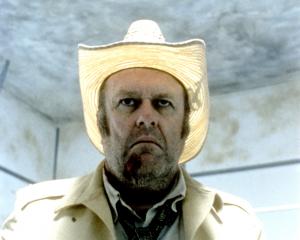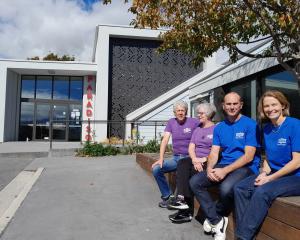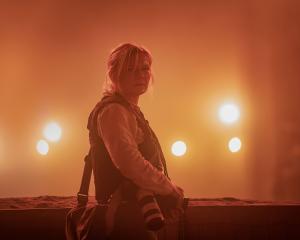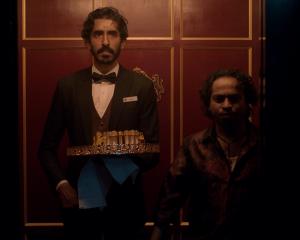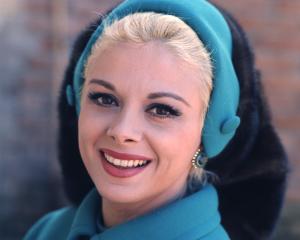Part underworld crime thriller, part existential character study, New Zealand film The Last Saint offers plenty of physical heft, too, writes Shane Gilchrist.
''I'm six-foot-two and those guys just dwarfed me.''
Long-time Dunedin film producer Aaron Watson, who has recently moved to Wellington, is referring not so much to height difference as the sheer muscular bulk of the Polynesian characters who loom large in New Zealand's latest feature film, The Last Saint.
Written and directed by Rene Naufahu (best known to audiences in New Zealand for his role as Sam Aleni in Shortland Street), the movie deals with the often violent underworld of methamphetamine dealers, familial dysfunction and, as its title suggests, the struggle between good and bad (and the grey areas in between).
The key protagonist is teenager Minka Jameson (played by Beulah Koale), who lives with his mum, Lia, in a tiny, shabby apartment in inner-city Auckland. Faced with the daily challenge of supporting his mother and keeping her off P, a drug that threatens to destroy her, Minka effectively has no life.
As the financial pressures mount, Minka reconnects with long-absent father Joe, who offers his son a job working as a ''glassie'' at his strip bar. Minka's first night descends into drunkenness and violence as he discovers his dad, a prominent member of Auckland's underworld, is a man of both great charisma and danger.
Joe delivers on his promise for higher paid work by dropping Minka on the doorstep of psychotic meth dealer Pinball (played by Naufahu's younger brother Joe). After surviving a terrifying initiation, Minka is drawn into a paradox: to earn the money he needs to provide for his mother, he must distribute P.
To avoid spoiling the plot any further, it's probably best to just describe the remainder of the film as a descent into darkness. Suffice to say, it's as much an existential character study as a plot-driven underworld crime thriller.
Or, as Watson summarises: ''Minka is just trying to keep his head above water.''
Fittingly, given its bleak outlook, much of The Last Saint was shot at night. That provided several benefits, says Watson, who was approached to take on a role as associate producer in 2012.
''We didn't have to worry about parking in inner-city Auckland and we were able to film unhindered. We did it fairly guerrilla-style, using small cameras. We didn't need big lighting set-ups and things like that.''
Main producer Matthew Horrocks points out that monetary constraints (the film had a budget of about $120,000) meant The Last Saint was shot ''incredibly quickly'', in just 20 days, in fact.
That tight timeframe informed the screen result.
''If the characters seem edgy, that's because the actors were,'' Horrocks laughs.
''The approach wouldn't work for all productions, but it did suit this style of film.
''The irony is, the tight budget brought a lot of benefits. For instance, everyone on the film got paid the same rate, $750 a week, so that made for a very egalitarian team. We sourced all our equipment and costumes for free.
''It helped that everything was shot within a mile of central Auckland so we didn't have to spend much on travel or accommodation.
''Auckland is a big character in the film, in the same way that Dunedin is in Scarfies.''
Horrocks has plenty of praise for Watson, who grew up in Corstorphine, Dunedin, and began his media career as an actor and writer for television, spent 15 years working in central Europe and Russia as a tour director and, more recently, has worked with director Jackie van Beek on short films including Little Red Riding Hood and Go The Dogs.
''Here was this good man from Otago working alongside all these Polynesian film-makers shooting this drug film in Auckland,'' Horrocks says.
''He brought a level-headed voice of calm and reason and did an amazing job.''
Both Watson and Horrocks were speaking the day before the film's New Zealand premiere, held at the Civic Theatre, Auckland, last Thursday. Given the film opens at theatres throughout New Zealand on Thursday, the pair expressed no small share of nerves.
''It is a year ago since we pushed the go button on the film,'' Horrocks says.
''The premiere is nerve-wracking. I try not to think about it.''
Watson: ''We have 1000 people coming tomorrow and there will be that feel-good factor with a lot of families of cast and crew attending. But we have to see how it plays to the public. The reviews so far have been good.
''One of the toughest things to do is look at something you've worked on because you do see all the wee gaps. But if I can take a step back, it is amazing what we have achieved as a team.
''Primarily, our focus has been to get this out to New Zealand audiences. So far, we have 17 confirmed screens around the country. We are also aiming for festivals and we have an international agent interested,'' Watson says.
Described as ''a modern Kiwi classic'' (The New Zealand Herald) and ''unflinching, brutal, vivid and, above all, human ... occupying the same compellingly dangerous territory as Once Were Warriors and Animal Kingdom'' (Piers Nightingale, Highpoint Films UK), The Last Saint benefits from some strong performances from its relatively small cast, Watson believes.
''I've just come back from Melbourne where I've been promoting the film to international sales agents and nobody talked about it looking like a cheap film. We obviously did something right.
''Everyone talked about the performances.''
Watson also commends Koale, who made his big-screen debut as a haunted killer in the short film Manurewa and recently featured in Shortland Street as Jared Afeaki, then on TV3 drama Harry.
''Beulah is a rising star. He's in just about every scene in the film. He was there every day for 12 hours a day and managed to keep up his energy.
''The film does deal with some dark territory. Of course, P is a very big problem in New Zealand. It crosses many social boundaries,'' Watson says.
''All the characters are quite iconic: you have the mother with the drug problem, the violent father ...
''Rene, the director, grew up in Otara, as did a lot of the cast, and they've seen stuff first-hand that might sound unbelievable.''
- The Last Saint opens at Rialto, Dunedin, on Thursday, August 28


